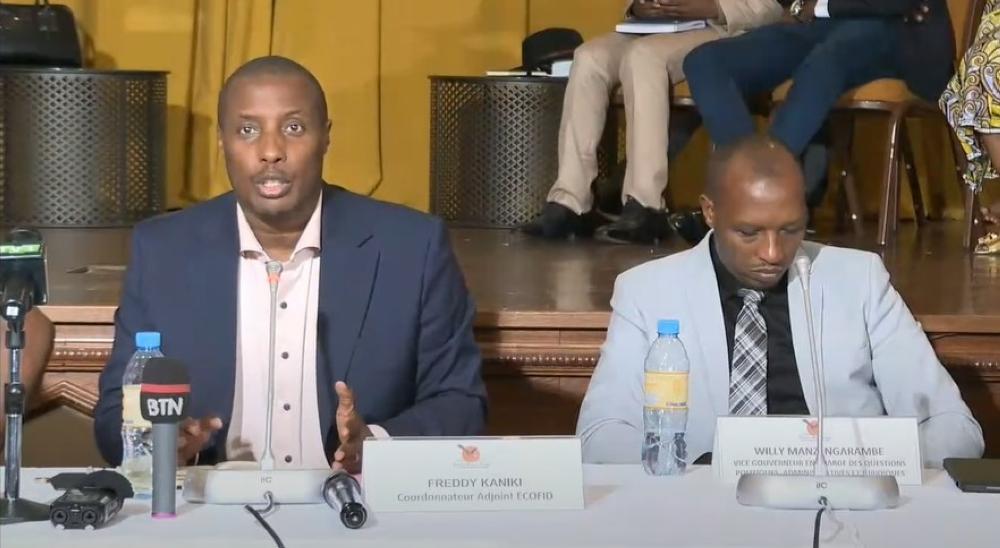Africa-Press – Rwanda. The AFC/M23 rebels have sent representatives to Doha, Qatar, but their mandate does not include negotiations about a peace agreement with the Congolese government.
AFC/M23 deputy coordinator Bertrand Bisimwa said this on Friday, August 22, at a news conference in Goma, four days after he announced his movement had sent a “technical team” to Doha, where they would “review the practical arrangements” that will enable the implementation of the Declaration of Principles signed in the Gulf country with Kinshasa on July 19.
“Yes, it’s true, we have a delegation in Doha, we have officially acknowledged it. The delegation is there to discuss, we have said, it’s to discuss only the ceasefire mechanisms and the prisoner release mechanisms to move forward,” Bisimwa said.
“When we finish this step, we can move on to something else. And we made it a point to specify in the mandate we gave to our delegation, which consists of two people, we reduced it to two people, because we thought that these issues, which were more technical than political, did not require a group of four, five, six people as we usually do. We said their mandate concerns only this technical phase of discussing the ceasefire mechanisms and prisoner release.”
Bisimwa suggested that a proposed peace agreement, which was reportedly submitted to both parties by Qatar last week, might have been influenced by the Congolese government.
“So, we have been precise at this stage, and no one will hold anyone hostage there to discuss this so-called draft [peace agreement] you have seen circulating, which comes from Kinshasa. I confirm, it’s Kinshasa that is proposing this draft,” he said.
Peace talks resumed earlier this week after the two parties missed the August 18 deadline to sign a peace agreement, after renewed hostilities were reported between since the beginning of the month in eastern DR Congo.
The rebels, who control swathes of territory in eastern DR Congo, including the two largest cities, have recently accused the Congolese government coalition of deploying new troops and equipment to multiple fronts.
The Doha talks began in April and were the first direct contact of the rebels and the Congolese government since the war that began in late 2021. The rebels took control of Goma and Bukavu cities in early 2025.
The Declaration of Principles signed on July 19 sought to lay the foundation for a peace agreement, which could end the three-decade episodic conflict.
Efforts to ‘undermine’ Doha talks
The movement leaders also addressed recent reports of the killings of civilians in North Kivu province, where UN human right offices alleged the rebels had killed more than 300 farmers in the Virunga National Park. Days later Human Rights Watch (HRW) released a report alleging the killing of about 140 civilians in the same area. The HRW report alleged that the victims came from the Hutu and Nande communities.
“The report comes in a time when we are about to start a negotiation in Doha on the most important issue, the root causes of the conflict. Why did it come at such a time?,” posed Freddy Kaniki, the deputy coordinator in charge economic affairs.
“This reminds us of what happened in 2012, when we were so close to signing an agreement between M23 and the government at the time. Another report came out that pushed the United Nations to become belligerent towards us. And that’s when a special unit was created in the Monusco to fight against M23.
“The same thing is being played here, and this time it’s not only against M23, they even put a component of ethnic hatred. They specify that those people whose image they couldn’t find, whose names they don’t know, are Hutu and Nande,” Kaniki said.
“In the report they don’t show how they knew they were Nande or they were Tutsi, but for some reason they just happen to be Hutu and Nande. Why? Because they want to stir ethnic hatred. They want to revive the war. They want to undermine the peace process in Doha. They want to propagate falsehoods.”
Kaniki said that the authors of the reports wrote them thousands of kilometres away from the alleged crime scene and no reports of a killing had been reported before the organisations published the reports, which do not mention names of the victims.
“Why no one on the ground was able to report on this or to leak any information related to the massacre of not 5 people, not 10, but 319 people? And someone in Geneva had to inform everyone of this massacre,” he said.
“We, as an organization, have requested an independent investigation. These people are not trees that are grown on a mountain where you can cut a tree and it’s over. These people had families. If they were really killed, they had families. They had villages where they lived. They had properties. They had fields. They had wealth. They had names.”
“Can someone come and show us who died? When did he die? Who killed him? And can the family members testify on that?”
For More News And Analysis About Rwanda Follow Africa-Press






